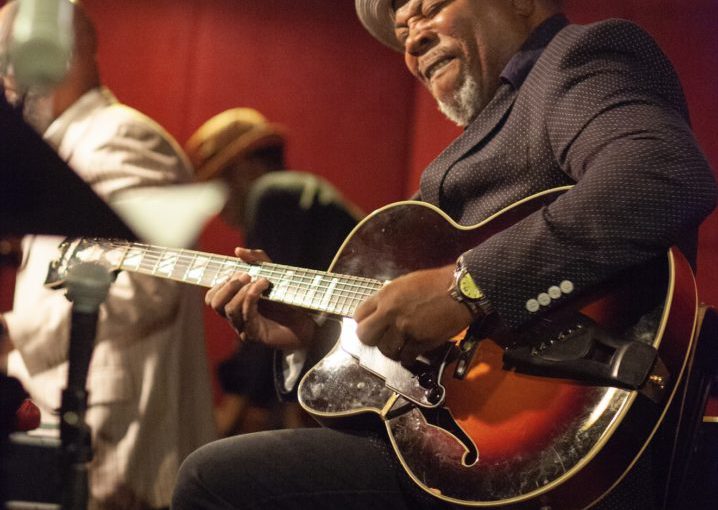Live Review: Grant Green’s Evolution of Funk in New York
Grant Green’s Evolution of Funk, which closed out a four-night stint at Jazz Standard in Manhattan on Sunday, July 1, is an unabashed tribute act. The quintet is fronted by Grant Green Jr., whose late father (1935-1979) remains one of jazz’s sleeper icons. In Blue Note Records’ fertile early-to-mid-’60s, Green the elder was an integral presence, a deft hard-bop guitarist whose horn-like lines and deep-soul licks could be identified through a thunderstorm, and who deserves to be in the same conversation as Wes Montgomery, Kenny Burrell, and even Jim Hall. From the late ’60s into the ’70s, he was also an architect of the jazz-funk and hit-copping that came to underpin smooth jazz, hip-hop, and certain strains of dance music.
Evolution of Funk, as the name implies, leans mostly on that latter phase, which might disappoint a decent chunk of Green’s cult. Still, in Sunday’s first set, the band did a fabulous job of paying homage to his hard-grooving and pop-leaning sides. With a lineup of Green Jr. on guitar, Donald Harrison Jr. on alto saxophone, Marc Cary on organ and piano, Khari Simmons on electric bass, and Mike Clark on drums, its destiny was manifest. (Monte Croft guested on vibes earlier in the Jazz Standard run.)
Green Sr. has recently seen some renewed interest, due to two terrific archival albums from Resonance Records: Slick! Live at Oil Can Harry’s, a quintet date captured in Vancouver in 1975, and Funk in France: From Paris to Antibes (1969-1970), which includes a loose trio set that’s a must-hear for Green devotees. (Mandatory plug: Drop by Barnes & Noble to pick up the July/August issue of JazzTimes, featuring a cover story on this lost music and Green’s legacy by David R. Adler.) The Jazz Standard shows were touted as a promotion for the new product and were recorded for future release.
Grant Green Jr. (left) and Donald Harrison Jr. at Jazz Standard in New York, June 30, 2018 (Photo: Bill Douthart)
Despite the higher-profile musicians alongside him, this was Green Jr.’s gig. The guitarist and singer—real name Greg Green; at his father’s recommendation he adopted the Jr. moniker for the stage—hasn’t been a familiar face on the national jazz scene, though he’s cropped up fruitfully over the years. Now in his early sixties, he played with organist Reuben Wilson and drummer Bernard Purdie in the Masters of Groove, a trio that delivered the soul-jazz goods after that tradition had found a new audience via hip-hop and acid jazz. His most recent disc, the 2016 Ropeadope album Soul Science, is an amalgam of vocal R&B, jazz-funk, and contemporary jazz, and he continues to perform around his base of Atlanta.
For jazz guitar enthusiasts, he can be a fascinating study. On a cursory listen, he doesn’t sound like his father as much as he evokes the organ-jazz pickers who rose after him—George Benson or Melvin Sparks or the many cratediggers’ favorites jazz history forgot. His dad’s phrasing combined a precision attack with a fluid, conversational quality that hearkened back to Charlie Christian’s proto-bebop. Junior seemed to home in on the more specifically guitaristic elements of his father’s style. You were more likely to remember the standout rhythmic moments of his solos than the melodic ones, and he used repetition as an asset, turning over licks through the passing changes or carrying one figure up and down the fretboard. When flashes of Sr. would come to the fore, it was somewhat surreal: those rapid-fire, out-of-nowhere scalar runs that caused the technique to break up a bit, those double-stop accents and signature trills.
Of course, the rhythmic concentration could have had something to do with the material, too, most of it culled from two LPs recorded after Green’s late-’60s return to Blue Note. From 1970’s Green Is Beautiful came the set’s bookends, Lennon/McCartney’s “A Day in the Life” and a truncated take on James Brown’s “Ain’t It Funky Now”; from Carryin’ On, released that same year, a version of the Little Anthony & the Imperials hit “Hurt So Bad” (also on Funk in France) and the deep cut “Cease the Bombing,” written by organist Neal Creque. Rounding out the program was something unimpeachable, “Idle Moments,” Duke Pearson’s gorgeous, noirish title tune off Green’s hard-bop classic recorded in ’63.
Grant Green’s Evolution of Funk
Left to right: Special guest Monte Croft, Marc Cary, Grant Green Jr., Khari Simmons, and Mike Clark at Jazz Standard in New York, June 30, 2018 (Photo: Bill Douthart)
The evening felt like a dispatch from a bygone era: clear-cut melodies you could sing; buoyant midtempo R&B rhythms; marathon performances of bendable arrangements that shifted at the nod of a head or the furrowing of an eyebrow; and an approach to presentation that was both professional and nonchalant. Harrison would drift away from the bandstand after doubling up with Green on the theme and taking his solo, then maybe play a background at side stage, listen to another solo or two and mosey back toward his mic in time to rejoin Green on the head. With hooting and hollering from the crowd that transcended the average jazz club gig, the Standard took on the cozy atmosphere of a corner bar where jazz-funk once thrived.
With some distinctions. The barbecue was better than the typical joint’s, for one, and the level of musicianship certainly wasn’t neighborhood-y. Harrison’s solos, as ever, blended a hardcore command of bop technique with staccato-funk finesse (and, on “Ain’t It Funky,” an impeccably timed “Pass the Peas” quote). Cary, whose organ should’ve been brought up in the mix, projected a similar symmetry, and Simmons proved a nimble anchor. Clark, the onetime Headhunter and still-underrated beatmaker, played funk as a kind of subliminal fusion, syncopating and displacing without compromising his role as the band’s ballast. Green gave the drummer some toward set’s end, and in his spotlight Clark burrowed into the toms and snare as if playing a shell game with the downbeat. The band laid out but the groove remained.



